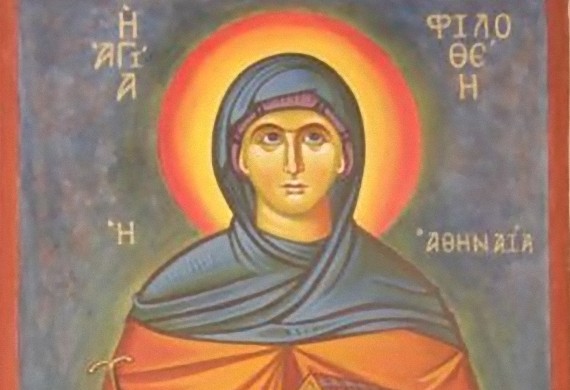St. Philothei was born in Athens with the name Revoula on November 21, 1522 to an illustrious and
wealthy family. Her parents were Angelos Venizelos and Syrigi Palaiologina, both from old Byzantine
families. They had no children, but after fervent prayer her mother conceived and gave birth to a
daughter, whom they named Revoula.
At the age of 14, Revoula was married against her will to the noble Andrea Chila, who mistreated
her. When he died 3 years later in 1539, she was only 17, beautiful and wealthy and her parents
insisted that she get remarried. Instead, she remained at home, spending much of her time in
prayer. The family wealth gave her the opportunity for charitable work, and while still a young
woman she had gained the respect and love of the Christian community of Athens.
When her parents died in 1549, Revoula found herself the owner of extensive holdings which she
was to use exclusively for charitable work. She entered the monastic life taking the name Philothei
and around 1551, she established a women’s monastery dedicated to St. Andrew the Apostle. There
the young nuns who flogged around her taught the girls of the community handiwork, weaving,
housekeeping and cooking. In this way, she was preparing the young women who came to her for
the domestic life.
Philothei is primarily remembered for her abundant philanthropy. Her monastery created a great
deal of charity establishments both in Athens and on the islands of the Aegean Sea. Then, abbess
Philothei proceeded to establish a second, more secluded monastery at Patesia. She also built
hospices, homes for the elderly, and schools for the girls and boys of Athens.
One of her more controversial and dangerous activities she became involved in was the buying of
the freedom of Greek Christians taken as slaves by the Ottoman Turks, especially of young women
who had been taken to the harems as sex slaves of the wealthy Turks. She would offer shelter to the
young women, especially some of whom that would be pregnant. She would then help them escape
secretly from the pursuing Turks to the islands of Tzia, Andros, Aegina and Salamina, where they
would be safe.
Over time, the expenses for her ransom and philanthropic projects and the frequent plunder of her
monasteries by the Turks, which devastated the farming agricultural programs – the basic source of
sustenance for her work – took a toll on the monastery finances. In a 22 February 1583 letter to the
Venetian Senate, Philothei asked for monetary support to pay off her debts which accumulated from
ransom money, duties, bribes, and taxes that she owed to the occupying Turks. She was in desperate
need for money in order to continue her philanthropic work.
Finally, the end to her ministry came closer when four women enslaved by the Ottoman Turks in
harems escaped and ran to her for refuge. The women were traced by the pursuing Turks, and
Philothei was arrested, beaten and brought before the magistrate who threw her into prison.
Friends intervened and paid the district governor for her release, but the Turks now knew what she
was doing.
As her fame grew, so did the animosity against her by the Turks. On Oct. 3, 1588, as Philothei was
attending an all-night vigil in honor of St. Dionysios the Areopagite, the first Bishop of Athens, at her
monastery at Patesia, four Turks broke into the monastery, entered the church, seized the fearless
abbess Philothei, dragged her and beat her severely. The sixty-seven year old nun never recovered
from the beating. Four months later, on Feb.19, 1589, Philothei of Athens died, martyred for Christ
and for her people.
Within a decade after her death, Patriarch Matthew II of Constantinople canonized Philothei,
enrolling her among the “blessed and holy women” of the Orthodox Church. Thus Philothei the
Blessed martyr of Christ and our God-bearing Mother joined the large company of women
recognized as Holy Mothers of our Church.
The entire area around her central monastery in Athens was named after her, including the street
where the main Cathedral of Athens was built. St. Philothei is considered the protector of Athens
and the advocate of the city’s poor.
Source:
https://holytransfiguration.info/our-faith/the-lives-of-holy-saints/st-philothei-of-athens/

